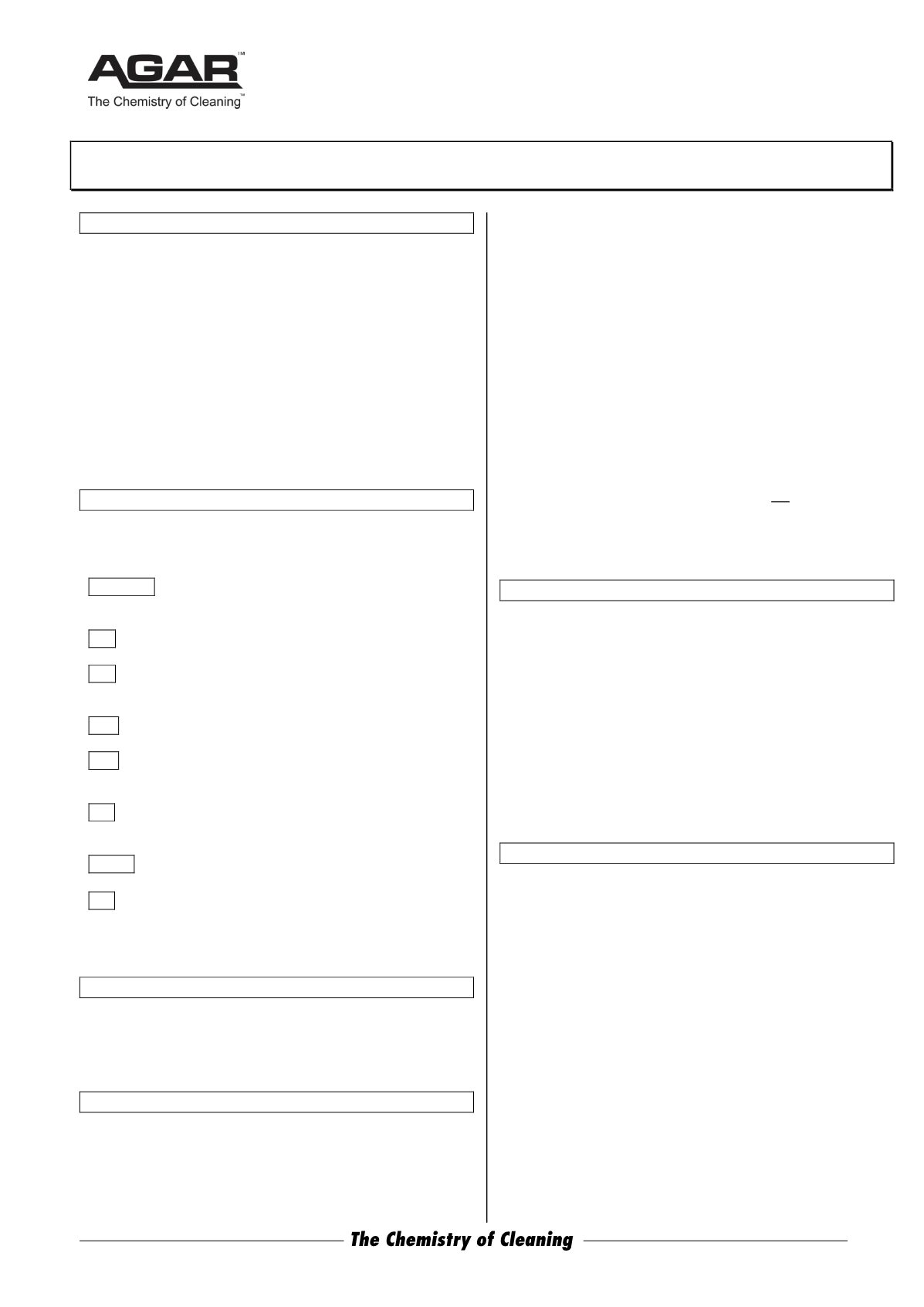

ABN 80 004 726 890 | MADE IN AUSTRALIA
VIC 03 9480 3000
NSW 02 9743 6020
SA 08 8293 2020
QLD 07 3274 3438
WA 08 9249 4566
Safety Data Sheet
Issued: September 15, 2011
Page 1 of 3
RUSTEX
1 IDENTIFICATION OF THE MATERIAL AND SUPPLIER
Product Name:
RUSTEX
Other Names: Hydrofluoric acid
Manufacturer's Product Code: RU250
Product Use: Dissolving rust stains in carpets and rugs.
COMPANY DETAILS
Company: Agar Cleaning Systems Pty. Ltd.
Address: 12-14 Cope Street, Preston, Vic. 3072
Telephone: 03 9480 3000 Facsimile: 03 9480 5100
Web:
www.agar.com.auAgar SDS are available from this website.
E-mail:
sales@agar.com.auEmergency Telephone Number: 131 126
(Aust wide)
2 HAZARDS IDENTIFICATION
Hazardous according to criteria of Safe Work Australia.
Toxic T; Corrosive C
R23/24/25 Toxic by inhalation, in contact with skin and
if swallowed.
R34 Causes burns.
R41 Risk of serious damage to eyes. Contact with
eyes even for short periods can cause blindness.
S1/2 Keep locked up and out of the reach of children.
S7/9 Keep container tightly closed and in a well-
ventilated place.
S26
In case of contact with eyes, rinse immediately
with plenty of water and seek medical advice.
S36/37 Wear suitable protective clothing and gloves.
S45 In case of accident or if you feel unwell, seek
medical advice immediately (show the label
whenever possible).
3 COMPOSITION / INFORMATION ON INGREDIENTS
Ingredients:
Chemical Entity: CAS No.: Proportion:
Hydrofluoric acid 7764-39-3 1%
Water 7732-18-5 to 100%
4 FIRST AID MEASURES
Poisons Information Centre: Phone 131 126
Swallowed: If poisoning occurs, contact a doctor or Poisons
Information Centre. Do NOT induce vomiting. Rinse mouth
with water and give large quantity of water containing six (6)
tablets of effervescent calcium gluconate. If these are not
available, milk may be substituted. CONSULT A DOCTOR
IMMEDIATELY. Never give anything by mouth to an
unconscious person.
Eye: Immediately hold the eyes open and wash continuously for
at least 15 minutes with fresh running water. Ensure irrigation
under eyelids by occasionally lifting the upper and lower lids.
Removal of contact lenses after an eye injury should only be
undertaken by skilled personnel. Consult a doctor. Instil
several drops of 10% calcium gluconate eye drops in eye.
Skin: Immediately remove any contaminated clothing and
shoes and flush affected area for at least one minute. Consult
a doctor. Massage Calcium Gluconate Gel into affected
areas. If no gel is available, continue to wash with soap. For
burns on the skin affecting more than 160
sq.cm. (the size of a
hand) in area, give four (4) tablets of effervescent calcium
gluconate, each tablet containing 400mg of calcium and 20mg
of ascorbic acid, with water by mouth.
Inhaled: Remove affected person to fresh air. Apply
resuscitation if victim is not breathing – Do not use direct
mouth-to-mouth method if victim swallowed or inhaled the
substance – use alternative respiratory method or proper
respiratory device. Lay patient down. Keep warm and rested.
Transport to doctor or hospital.
5 FIRE FIGHTING MEASURES
Fire/Explosion Hazard: Rustex is not combustible. If allowed to
react with soft metals however, flammable hydrogen gas may
be liberated. If heated, Rustex will produce choking toxic
fumes of hydrogen fluoride.
Fire Extinguishing Media: Use CO
2,
dry chemical, dry sand or
flooding quantities of water for a small fire.
Fire Fighters’ PPE: Wear SCBA and acid-resistant chemical
splash suit. Structural fire fighter’s uniform is NOT effective for
this material.
Special fire-fighting procedures: In a fire situation, water spray
may be used to cool containers. Fire breathing apparatus and
full protective clothing. Wash acid away from metal surfaces.
Hazardous products of combustion: Thermal decomposition in a
large fire may yield toxic fumes.
6 ACCIDENTAL RELEASE MEASURES
Do not touch or walk through spilled material. Clean up all spills
immediately. For cleaning small spills, operators should wear
protective clothing and respirator. Large spills require full
protective clothing, PVC clothing and air supplied breathing
apparatus. Stop leak if it is safe to do so. Keep people away
from fumes if present. Absorb liquid on dry, inert material such
as earth and carefully neutralise with lime or soda ash mixed
with earth. Prevent entry into waterways, drains or pits.
Transfer to clean, suitably labelled plastic containers and
dispose of in approved chemical dump in accordance with
regulations.
Please turn to page 2.


















